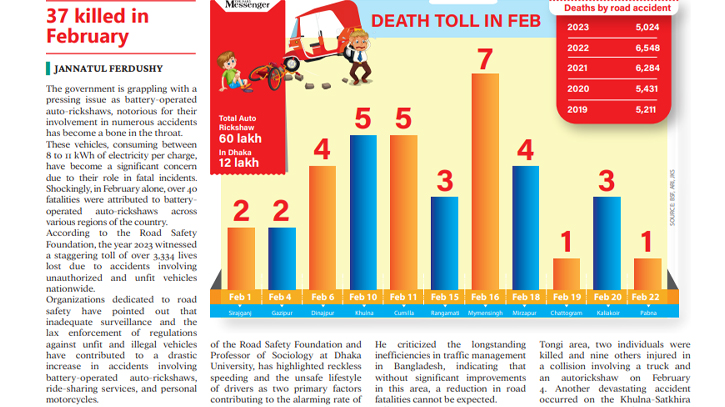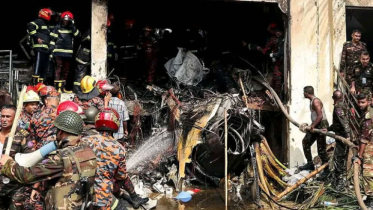
Photo : Messenger
The government is grappling with a pressing issue as battery-operated auto-rickshaws, notorious for their involvement in numerous accidents has become a bone in the throat.
These vehicles, consuming between 8 to 11 kWh of electricity per charge, have become a significant concern due to their role in fatal incidents.Shockingly, in February alone, over 40 fatalities were attributed to battery-operated auto-rickshaws across various regions of the country.
According to the Road Safety Foundation, the year 2023 witnessed a staggering toll of over 3,334 lives lost due to accidents involving unauthorized and unfit vehicles nationwide.
Organizations dedicated to road safety have pointed out that inadequate surveillance and the lax enforcement of regulations against unfit and illegal vehicles have contributed to a drastic increase in accidents involving battery-operated auto-rickshaws, ride-sharing services, and personal motorcycles.
Addressing this pressing issue requires not only stricter enforcement of existing laws but also comprehensive measures to improve surveillance and ensure the fitness of vehicles on the road.
Mahbub Uddin Ahmed, Chairman of the Road Safety Foundation and Professor of Sociology at Dhaka University, has highlighted reckless speeding and the unsafe lifestyle of drivers as two primary factors contributing to the alarming rate of accidents.
Mahbub emphasized the lack of monitoring by the administration, particularly regarding vehicle fitness, despite vehicles operating on the roads without meeting safety standards.
He criticized the longstanding inefficiencies in traffic management in Bangladesh, indicating that without significant improvements in this area, a reduction in road fatalities cannot be expected.
Official reports have shed light on several tragic incidents in recent times. In Shahjadpur upazila, a woman and her daughter lost their lives when a passenger bus collided with a CNG-operated autorickshaw on February 1. Similarly, in the Tongi area, two individuals were killed and nine others injured in a collision involving a truck and an autorickshaw on February 4. Another devastating accident occurred on the Khulna-Satkhira highway, where five people, including two women and a minor child, were killed, and three others injured in a collision between a brick-laden truck and a battery-operated auto-rickshaw in Dumuria upazila, Khulna, on February 19.
Tragedy struck again on February 22 when a man lost his life in a gas cylinder explosion at a CNG filling station in the Debipur area of Feni along the Dhaka-Chittagong highway. Additionally, four individuals were killed in a collision involving a BRTC bus and a rickshaw van in Chirirbandar upazila, Dinajpur, on February 6. In yet another heartbreaking incident, seven people lost their lives in a head-on collision between a bus and a CNG-operated autorickshaw in Mymensingh on February 16.
The grim toll of accidents continues, as evidenced by the tragic incident in Iswardi upazila of Pabna on February 22, where a CNG-operated autorickshaw driver lost his life, and five others were injured in a collision with a private car.
Despite numerous accidents, banned battery-operated rickshaws continue to proliferate in the capital and throughout the country, flouting instructions from the High Court to cease operations. These illegal vehicles pose a significant threat to public safety, often speeding recklessly along important roads and contributing to accidents and loss of life.
Battery-run auto-rickshaws, fitted with motors to the rickshaw structure, are particularly vulnerable due to their weak structure and inherent imbalance, as highlighted by research from the Bangladesh University of Engineering (BUET).
Shockingly, these vehicles are implicated in 20 percent of annual fatalities, according to BUET's findings. Behind the persistence of these illegal vehicles lies a powerful syndicate, allegedly involving local leaders of the ruling party, police, and extortionists.
Several battery-run auto-rickshaw drivers revealed that they pay monthly sums ranging from Tk 700 to Tk 1,000 to influential individuals for permission to operate on the roads. In return, they receive various symbols such as 'Seven Star', 'M', 'Shapla', 'Kadamful', 'Grain of Rice', and 'Boat', which serve as a shield against police scrutiny. However, those without these symbols face hefty fines ranging from Tk 3,000 to Tk 4,000 if caught.
Dr. Md. Hadiuzzaman, Director of BUET's Accident Research Institute, emphasized the challenging task of controlling battery-run autorickshaws while also acknowledging the livelihood concerns of the drivers.
Dates Killed by accident Accident place
February 1 2 Sirajgonj
February 4 2 Gazipur
February 6 4 Dinajpur
February 10 5 Khulna
February 11 5 Cumilla
February 15 3 Rangamati
February 16 7 Mymensing
February 18 4 Mirzapur
February 19 1 Chittagong
February 20 3 Kaliakoir
February 22 1 Pabna
Messenger/Fameema








